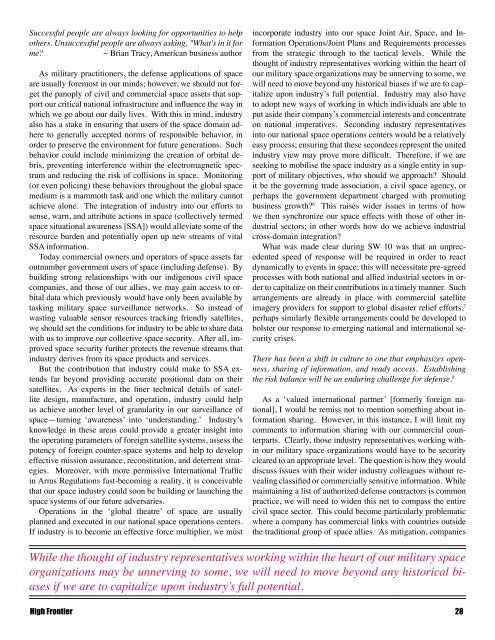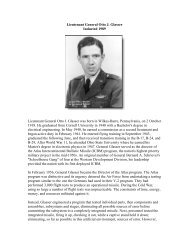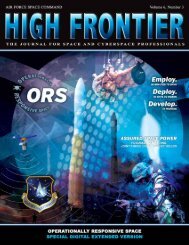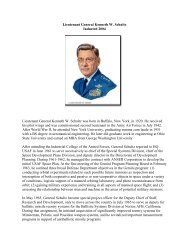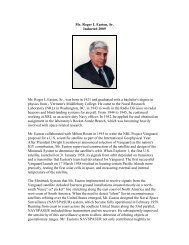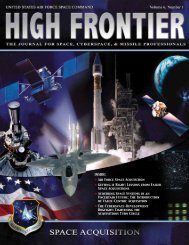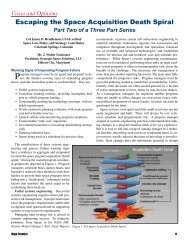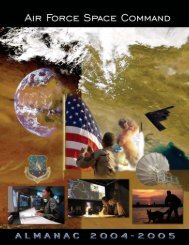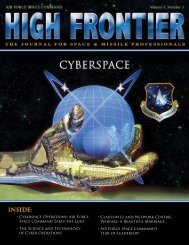Schriever Wargame 2010 - Air Force Space Command
Schriever Wargame 2010 - Air Force Space Command
Schriever Wargame 2010 - Air Force Space Command
- No tags were found...
Create successful ePaper yourself
Turn your PDF publications into a flip-book with our unique Google optimized e-Paper software.
Successful people are always looking for opportunities to help<br />
others. Unsuccessful people are always asking, "What's in it for<br />
me<br />
~ Brian Tracy, American business author<br />
As military practitioners, the defense applications of space<br />
are usually foremost in our minds; however, we should not forget<br />
the panoply of civil and commercial space assets that support<br />
our critical national infrastructure and influence the way in<br />
which we go about our daily lives. With this in mind, industry<br />
also has a stake in ensuring that users of the space domain adhere<br />
to generally accepted norms of responsible behavior, in<br />
order to preserve the environment for future generations. Such<br />
behavior could include minimizing the creation of orbital debris,<br />
preventing interference within the electromagnetic spectrum<br />
and reducing the risk of collisions in space. Monitoring<br />
(or even policing) these behaviors throughout the global space<br />
medium is a mammoth task and one which the military cannot<br />
achieve alone. The integration of industry into our efforts to<br />
sense, warn, and attribute actions in space (collectively termed<br />
space situational awareness [SSA]) would alleviate some of the<br />
resource burden and potentially open up new streams of vital<br />
SSA information.<br />
Today commercial owners and operators of space assets far<br />
outnumber government users of space (including defense). By<br />
building strong relationships with our indigenous civil space<br />
companies, and those of our allies, we may gain access to orbital<br />
data which previously would have only been available by<br />
tasking military space surveillance networks. So instead of<br />
wasting valuable sensor resources tracking friendly satellites,<br />
we should set the conditions for industry to be able to share data<br />
with us to improve our collective space security. After all, improved<br />
space security further protects the revenue streams that<br />
industry derives from its space products and services.<br />
But the contribution that industry could make to SSA extends<br />
far beyond providing accurate positional data on their<br />
satellites. As experts in the finer technical details of satellite<br />
design, manufacture, and operation, industry could help<br />
us achieve another level of granularity in our surveillance of<br />
space—turning ‘awareness’ into ‘understanding.’ Industry’s<br />
knowledge in these areas could provide a greater insight into<br />
the operating parameters of foreign satellite systems, assess the<br />
potency of foreign counter-space systems and help to develop<br />
effective mission assurance, reconstitution, and deterrent strategies.<br />
Moreover, with more permissive International Traffic<br />
in Arms Regulations fast-becoming a reality, it is conceivable<br />
that our space industry could soon be building or launching the<br />
space systems of our future adversaries.<br />
Operations in the ‘global theatre’ of space are usually<br />
planned and executed in our national space operations centers.<br />
If industry is to become an effective force multiplier, we must<br />
incorporate industry into our space Joint <strong>Air</strong>, <strong>Space</strong>, and Information<br />
Operations/Joint Plans and Requirements processes<br />
from the strategic through to the tactical levels. While the<br />
thought of industry representatives working within the heart of<br />
our military space organizations may be unnerving to some, we<br />
will need to move beyond any historical biases if we are to capitalize<br />
upon industry’s full potential. Industry may also have<br />
to adopt new ways of working in which individuals are able to<br />
put aside their company’s commercial interests and concentrate<br />
on national imperatives. Seconding industry representatives<br />
into our national space operations centers would be a relatively<br />
easy process; ensuring that these secondees represent the united<br />
industry view may prove more difficult. Therefore, if we are<br />
seeking to mobilise the space industry as a single entity in support<br />
of military objectives, who should we approach Should<br />
it be the governing trade association, a civil space agency, or<br />
perhaps the government department charged with promoting<br />
business growth 6 This raises wider issues in terms of how<br />
we then synchronize our space effects with those of other industrial<br />
sectors; in other words how do we achieve industrial<br />
cross-domain integration<br />
What was made clear during SW 10 was that an unprecedented<br />
speed of response will be required in order to react<br />
dynamically to events in space; this will necessitate pre-agreed<br />
processes with both national and allied industrial sectors in order<br />
to capitalize on their contributions in a timely manner. Such<br />
arrangements are already in place with commercial satellite<br />
imagery providers for support to global disaster relief efforts, 7<br />
perhaps similarly flexible arrangements could be developed to<br />
bolster our response to emerging national and international security<br />
crises.<br />
There has been a shift in culture to one that emphasizes openness,<br />
sharing of information, and ready access. Establishing<br />
the risk balance will be an enduring challenge for defense. 8<br />
As a ‘valued international partner’ [formerly foreign national],<br />
I would be remiss not to mention something about information<br />
sharing. However, in this instance, I will limit my<br />
comments to information sharing with our commercial counterparts.<br />
Clearly, those industry representatives working within<br />
our military space organizations would have to be security<br />
cleared to an appropriate level. The question is how they would<br />
discuss issues with their wider industry colleagues without revealing<br />
classified or commercially sensitive information. While<br />
maintaining a list of authorized defense contractors is common<br />
practice, we will need to widen this net to compass the entire<br />
civil space sector. This could become particularly problematic<br />
where a company has commercial links with countries outside<br />
the traditional group of space allies. As mitigation, companies<br />
While the thought of industry representatives working within the heart of our military space<br />
organizations may be unnerving to some, we will need to move beyond any historical biases<br />
if we are to capitalize upon industry’s full potential.<br />
High Frontier 28


